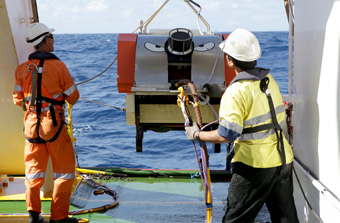
Image courtesy of Australian Transportation Safety Bureau
Three Year Search for MH370
Called Off
| published January 17, 2017 |
By Thursday Review staff writers
According to spokespersons for various international authorities, the search for the still missing Malaysian Air Flight MH370—which vanished without a trace in 2014—has been terminated. The announcement comes after search teams completed reconnaissance of more than 46,000 square miles of ocean in the area where MH370 was believed to have crashed.
The extensive search, which has been conducted over a period of nearly three years, has produced no tangible clues, nor a single piece of debris. According to Malaysia Airlines, 239 passengers and crew were on board the plane when it went missing.
In Asia, families of those who went missing as a result of the presumed crash have implored officials to continue the search and to extend the search area. The vast majority of the search has been in remote areas of the southern Indian Ocean.
The Boeing 777 took off from Kuala Lumpur for a long flight to Beijing, China on March 8, 2014. After what most authorities believe was a routine first leg of the journey, the plane made brief contact with air traffic controllers in Malaysia just moments before the jetliner would have entered the flight control space of Vietnam. At that moment, evidence shows that the plane made an abrupt and sharp turn toward the west and southwest, where it disappeared from radar and radio contact.
Experts believe the plane flew across a vast area of the south Indian Ocean before possibly crashing into the water. Though the search was adjusted and extended over time, no trace of the plane or its passengers has ever been found.
In the summer of 2015, several small pieces of debris from the plane may have washed up on the rocky shores of islands thousands of miles away along the east coast of Africa, though investigators have not been able to conclude with certainty that those materials were from flight MH370. Computer models of ocean currents show that the debris could have floated that enormous distance before washing ashore.
The extensive search for MH370 was the most complex, geographically challenging, and expensive, in aviation history. More than two dozen countries participated in the search, including the United States, China, Malaysia, Australia, New Zealand, Indonesia, Japan, and Thailand. Primary funding for the search came from Australia, Malaysia and China, but the U.S., Britain and several other countries supplied the search teams with military and technological support. The search also included extensive recalibration of satellites in space—including those of the U.S. and China—to assist in finding clues.
None of the so-called “black boxes” have ever been found, and the batteries meant to supply those electronics with location signals died months after the presumed crash. No other electronic evidence has ever been detected.
Several alternate theories have also failed to produce any tangible results, including theories that the plane was redirected toward central Asia or toward the Middle East.
The multinational task force managing the search issued a statement on Monday explaining its reason for halting the search.
“Despite every effort using the best science available, cutting edge technology, as well as modelling and advice from highly skilled professionals who are the best in their field, unfortunately, the search has not been able to locate the aircraft. Accordingly, the underwater search for MH370 has been suspended."
In December of last year, the Australian Transportation Safety Bureau completed its own scientific review of the search areas and possible crash sites, and the report it issued suggested that funding be extended to search an additional 9,000-square-mile area slightly north of the main search area The ATSB’s data—which used several advanced computer models—said that the plane may have crashed into the ocean somewhat short of original estimates.
Despite this report, and citing inconclusive evidence and non-specific data, none of the governments involved approved additional funding for the search for MH370. Several advocacy groups for the families of the missing have demanded that the search continue, and have suggested that the search footprints be extended to include the areas suggested by the new report.
Related Thursday Review articles:
Lost and Clueless: CNN in the Unfriendly Skies; R. Alan Clanton; Thursday Review; March 15, 2014.
US Satellite Detected Heat Before Crash; Thursday Review staff; Thursday Review; November 3, 2015.
